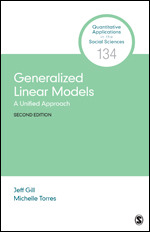Generalized Linear Models
A Unified Approach
- Jeff Gill - American University, USA
- Michelle Torres - Rice University, USA
Generalized Linear Models: A Unified Approach provides an introduction to and overview of GLMs, with each chapter carefully laying the groundwork for the next. The Second Edition provides examples using real data from multiple fields in the social sciences such as psychology, education, economics, and political science, including data on voting intentions in the 2016 U.S. Republican presidential primaries. The Second Edition also strengthens material on the exponential family form, including a new discussion on the multinomial distribution; adds more information on how to interpret results and make inferences in the chapter on estimation procedures; and has a new section on extensions to generalized linear models.
Software scripts, supporting documentation, data for the examples, and some extended mathematical derivations are available on the authors’ websites (http://jeffgill.org/publications/generalized-linear-models-unified-approach-0). Supporting material (data and code) to replicate the examples in the book can be found in the 'GLMpack' package on CRAN or on the website https://github.com/smtorres/GLMpack as well as through the \texttt{R} package \texttt{GLMpack}.

